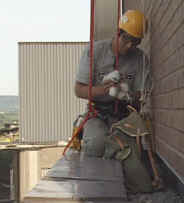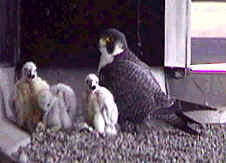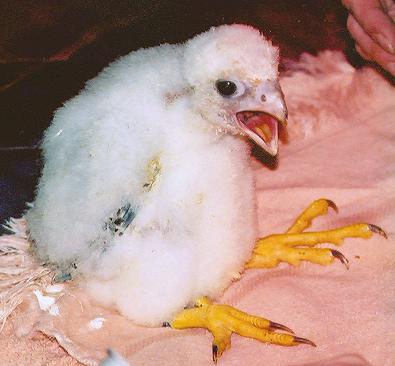Occasionally Peregrine Falcons fail to produce fertile
eggs. This can be due to contaminants in the environment, climatic
conditions, or other factors. The goal of Project Foster is to intervene
in such situations by providing the nesting pair with foster chicks to take care
of.
| Project Foster was launched in
the spring of 1999 when it became apparent that the eggs at the Hamilton
nest were not going to hatch. The Canadian Peregrine Foundation
quickly swung into action, tracking down two captive-bred peregrine
chicks that could be fostered into the nest, and raising the money
needed to purchase them from the breeder. With considerable
trepidation, the three-week old chicks were placed in the nest on May
21, 1999. Fostering had never before been attempted with such old
chicks, and it was unknown whether the parents would ignore them, kill
them, or adopt them. To the relief of all, the adult male landed
at the nest within ten minutes of the chicks arriving, and within half
an hour, both adults were present feeding them. To read more about
this historic event, visit the May 1999 section of the Hamilton
Archives. One of the two chicks, George, has gone on to become
the resident adult male in London, Ontario, and has already contributed
significantly to the growth of the peregrine population in his two years
there. |

Rick Folkes has lowered himself to the nest ledge and is about
to introduce George to his new home. (Photo by Paul Grieve)
|
|

Connor supervises the three new arrivals while Horizon
is off hunting for lunch. (Webcam snapshot by Marion Nash) |
No sooner had the Hamilton
fostering been carried out, than it became apparent that a similar
situation was developing in Ottawa. Once again, frantic phone
calls were made to locate chicks available for fostering, and a
fundraising campaign was started. An appeal for donations was
placed on the Ottawa page of the CPF website, and it was largely through
the overwhelming response of our viewers that we were able to purchase
three chicks for release. This time they were only 15-18 days old,
but again there were some very tense moments as everyone waited to see
how the adults would respond. Once again, both parents quickly
took to their new offspring, and the three chicks were all raised
successfully - see the Ottawa Archives
for the full story. Remarkably, considering the bad luck of many
other Ottawa fledglings before and since, all three took flight without
any major problems. One of the three has been spotted as an adult
in Toronto. |
-
In 2000, the Canadian Peregrine Foundation was prepared to step in with
Project Foster again if necessary, but fortunately the need did not
arise at any of the Ontario nest sites. However, the opposite was
true in 2001. When the eggs of the St. Catharines pair disappeared
early during incubation, plans were set in motion to foster chicks at
that site. Unfortunately, the adults lost interest in the site
quickly, and since they had not raised young previously, it was decided
that fostering in these circumstances constituted too great a
risk. |
| Later in the spring, only one of
three eggs hatched in Ottawa, and with the support of the TD Friends of
the Environment Foundation, a foster chick was procured to be added to
the site. This was the first time that we had added a chick to a
site which already had a chick in the nest, and again we held our breath
to see what the reaction would be. The "natural" chick
seemed a bit perturbed by his new sibling for the first few minutes, but
the adults again accepted it immediately, and by the second day all were
getting along wonderfully. Read more about this event in the Ottawa
Archives. Unfortunately in this case the foster chick perished
when it flew into a building on its first flight. |

The foster chick squawks following its last feeding
before being placed out on the nest ledge. (Photo by Marcel
Gahbauer)
|
While some might see the
death of this chick and claim that we wasted money on that chick, we
disagree. The reality is that not every chick, whether natural or
fostered, will survive to adulthood - in fact far fewer than half will
reach maturity. We can never know in advance which individuals are
going to be successful and which aren't. All that we can be
certain of is that the greater the number of chicks in the wild to begin
with, the higher the number of peregrines likely to grow up in the
wild. While disappointments such as this are inevitably going to
occur from time to time, we therefore maintain that fostering is a very
worthwhile endeavour.
To date, 5 of 6 peregrines fostered by the
Canadian Peregrine Foundation have survived to the end of their first
summer - a rate of success higher than that of most natural nests, and
also better than that of most hack releases. Fostering has also
been proven to be a very effective way of boosting the population in
other parts of North America. The Canadian Peregrine Foundation is
prepared to again consider fostering chicks in the spring of 2002 at
sites where most or all eggs fail to hatch.
|
While private donors have been very generous
in support of Project Foster, it can be very difficult to raise the money
required on short notice. We are looking for sponsors to help sponsor
Project Foster - if you can help, or know of someone who might be interested,
please contact us. All
sponsors will be fully recognized on the CPF website, in Talon
Tales, and at the site where the foster takes place.
If you have any questions, comments, or
suggestions about Project Foster, please e-mail us.
RETURN TO COMPLETE SITE INDEX
(or choose from selected popular links below)
CPF INFORMATION:
| Home | News
| Talon Tales | Search
|
| Membership | Adopt a Peregrine | Gift Shop |
| About CPF | CPF Projects |
Project Track-'em | Education Program |
BIRD INFORMATION:
| Webcams | Photo Galleries |
Sightings | Identification
Tips |
| Peregrine information | Owls
| Other Raptors |
Links |
©
Canadian Peregrine Foundation


